新概念英语第二册第三课
新概念英语第二册第三课(精校版)
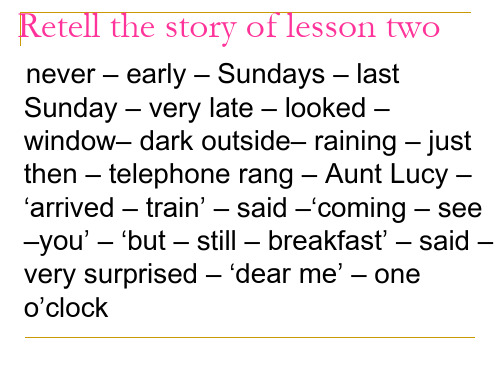
I visited museums and sat in public gardens. A friendly waiter taught me a few words of Italian. teach sb. sth. 教某人某事 王老师上学期教我们语文 Miss Wang taught us Chinese last term. He teaches our English.
★spoil(spoiled,spoilt) ① vt. 弄坏,损坏,糟蹋 这不幸的消息使我们没能过好周末。 The sad news spoiled our weekend. 这场雨把学校运动会弄得一团糟。 The rain spoiled the school sports meeting. This spoiled my day. What you said spoiled me. His arrival spoiled my holiday.
Lesson 3 Please send me a card!
Pictures of Rome
Crazy for ancient culture?
“All roads lead to Rome!”
Crazy for fashion?
Go to Milan!!!
Crazy for water and carnival?
ቤተ መጻሕፍቲ ባይዱ
★lend v. 借给 (借出) lend sth. to sb/lend sb. sth. 你能把你的自行车借给我吗? Can you lend me your bike? Can you lend me ¥20 please? I’ll pay/give it back tomorrow. borrow (借进):borrow sth. from sb./borrow sth. (borrow不能用 borrow sb. sth.) 他昨天借了我的笔。 He borrowed my pen yesterday. I lent him my pen yesterday. = I lent my pen to him yesterday.
新概念英语第二册第三课(包含课文及完整课后练习)
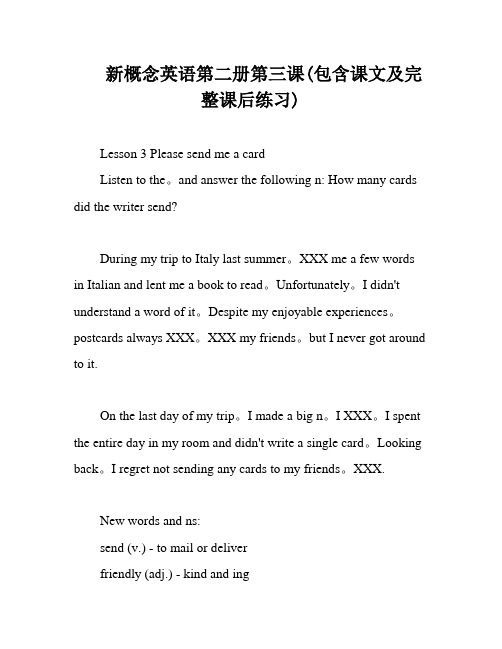
新概念英语第二册第三课(包含课文及完整课后练习)Lesson 3 Please send me a cardListen to the。
and answer the following n: How many cards did the writer send?During my trip to Italy last summer。
XXX me a few words in Italian and lent me a book to read。
Unfortunately。
I didn't understand a word of it。
Despite my enjoyable experiences。
postcards always XXX。
XXX my friends。
but I never got around to it.On the last day of my trip。
I made a big n。
I XXX。
I spent the entire day in my room and didn't write a single card。
Looking back。
I regret not sending any cards to my friends。
XXX.New words and ns:send (v.) - to mail or deliverfriendly (adj.) - kind and ingpostcard (n.) - a card for sending a message by mailwaiter (n.) - a person who XXXspoil (v.) - to ruin or damagelend (v.) - to give something to someone for a short d of timemuseum (n.) - a place where objects of historical。
最新新概念英语第二册第三课(包含课文及完整课后练习)
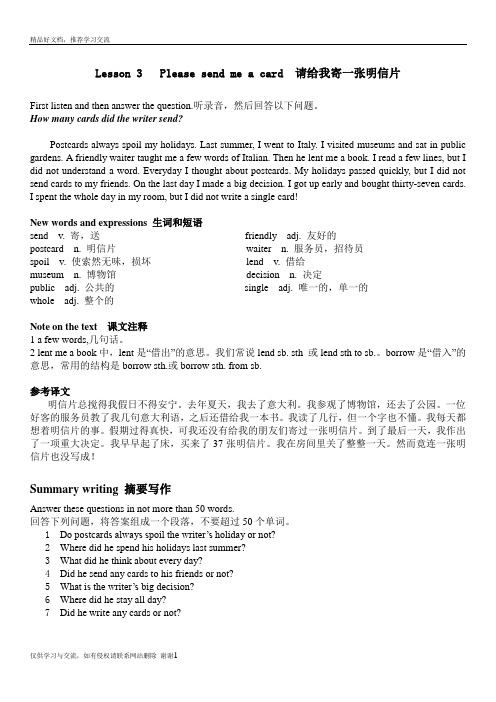
Lesson 3 Please send me a card 请给我寄一张明信片First listen and then answer the question.听录音,然后回答以下问题。
How many cards did the writer send?Postcards always spoil my holidays. Last summer, I went to Italy. I visited museums and sat in public gardens. A friendly waiter taught me a few words of Italian. Then he lent me a book. I read a few lines, but I did not understand a word. Everyday I thought about postcards. My holidays passed quickly, but I did not send cards to my friends. On the last day I made a big decision. I got up early and bought thirty-seven cards.I spent the whole day in my room, but I did not write a single card!New words and expressions 生词和短语send v. 寄,送friendly adj. 友好的postcard n. 明信片waiter n. 服务员,招待员spoil v. 使索然无味,损坏lend v. 借给museum n. 博物馆decision n. 决定public adj. 公共的single adj. 唯一的,单一的whole adj. 整个的Note on the text 课文注释1 a few words,几句话。
新概念英语第二册第三课课文详解
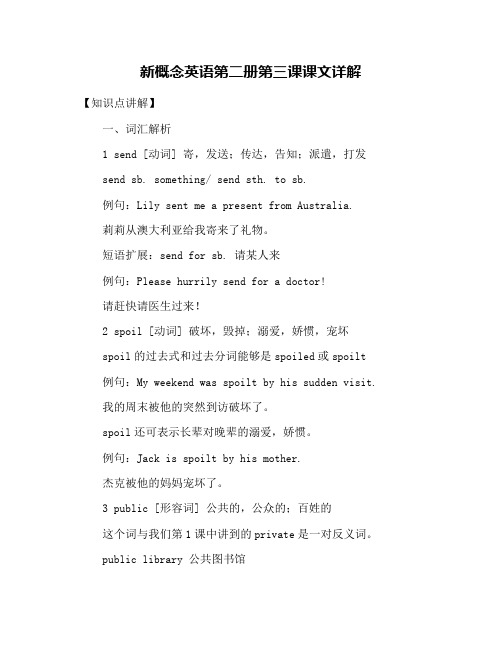
新概念英语第二册第三课课文详解【知识点讲解】一、词汇解析1 send [动词] 寄,发送;传达,告知;派遣,打发send sb. something/ send sth. to sb.例句:Lily sent me a present from Australia.莉莉从澳大利亚给我寄来了礼物。
短语扩展:send for sb. 请某人来例句:Please hurrily send for a doctor!请赶快请医生过来!2 spoil [动词] 破坏,毁掉;溺爱,娇惯,宠坏spoil的过去式和过去分词能够是spoiled或spoilt例句:My weekend was spoilt by his sudden visit.我的周末被他的突然到访破坏了。
spoil还可表示长辈对晚辈的溺爱,娇惯。
例句:Jack is spoilt by his mother.杰克被他的妈妈宠坏了。
3 public [形容词] 公共的,公众的;百姓的这个词与我们第1课中讲到的private是一对反义词。
public library 公共图书馆public transport 公共运输例句:The media has a great influence on public opinion.传媒对大众舆论有很大影响。
public也能够作名词,前面加定冠词the,表示平民,百姓。
例句:The president gave a speech to the public.总统对公众实行了演讲。
4 friendly [形容词] 友好的,友爱的;亲切的,善意的;朋友似的friendly是一个形容词,要特别注意,它的比较级和级分别是friendlier,friendliest。
短语扩展:friendly to/ towards sb.例句:Everyone was friendly to me.每个人对我都很友好。
friendly match 友谊赛5 lend [动词] 借给,借出lend (out) sth. to sb./ lend sb. sth.例句:Can you lend me your cellphone?你能把手机借我用用吗?lend,borrow,keep的区别两者都可表示"借",但是 borrow 指"借入",而 lend 则指"借出",两者其实是一对反义词,而不是同义词。
新概念英语第二册lesson-3
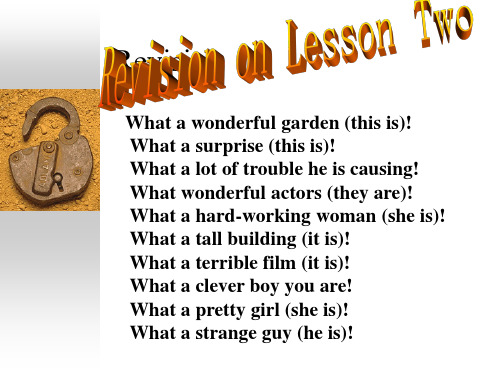
以上三个是指物理上的破坏, 而spoil主要指精神 上
Lend (lent) (lent ) v. 借出
lend sth.to sb=lend sb.sth. Can you lend 50 yuan to me? lend me your ears. 请听过我说。
public house简称pub : 酒吧 ; public place 公共场所. public lavatory ['lævətɔri】 公厕
in public:公开的; in private:私下里的 Let’s have a conversation in private. 让我们私下谈谈? Why not has a conversation in public? 为什么不公开谈呢?(当面说呢?)
Pair discussion!
Now, imagine you are having a trip overseas. And you only have 1, only 1, postcard. Who do you want to send to?
Now, everyone have 3 minutes to tell your partner. Let’s begin!
Germany German
Ireland Irish
Brazil
Brazilian
America American
Greece Greek
Canada Canadian
Australia Australian
(完整版)新概念英语第二册第三课(包含课文及完整课后练习)(最新整理)
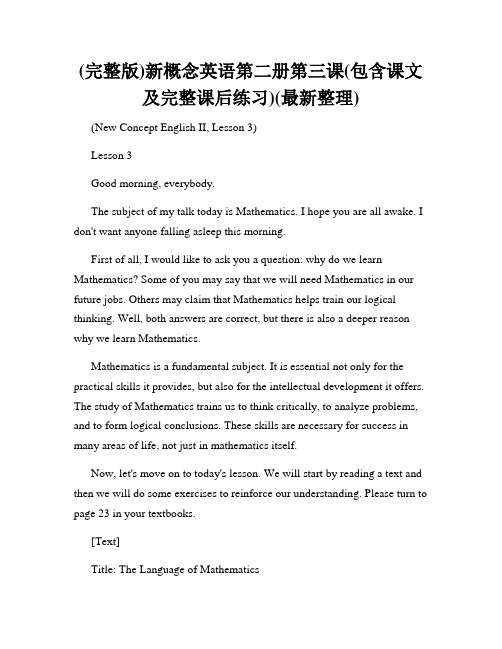
(完整版)新概念英语第二册第三课(包含课文及完整课后练习)(最新整理)(New Concept English II, Lesson 3)Lesson 3Good morning, everybody.The subject of my talk today is Mathematics. I hope you are all awake. I don't want anyone falling asleep this morning.First of all, I would like to ask you a question: why do we learn Mathematics? Some of you may say that we will need Mathematics in our future jobs. Others may claim that Mathematics helps train our logical thinking. Well, both answers are correct, but there is also a deeper reason why we learn Mathematics.Mathematics is a fundamental subject. It is essential not only for the practical skills it provides, but also for the intellectual development it offers. The study of Mathematics trains us to think critically, to analyze problems, and to form logical conclusions. These skills are necessary for success in many areas of life, not just in mathematics itself.Now, let's move on to today's lesson. We will start by reading a text and then we will do some exercises to reinforce our understanding. Please turn to page 23 in your textbooks.[Text]Title: The Language of MathematicsMathematics is a universal language. It is a way of communicating ideas, concepts, and information through numerical symbols and logical patterns. The beauty of Mathematics lies in its simplicity, clarity, and precision.In the world of Mathematics, numbers and symbols take on different meanings and represent various concepts. For example, the symbol "π" represents the ratio of the circumference of a circle to its diameter. Every number and symbol has a specific role and function in the language of Mathematics.Another fascinating aspect of Mathematics is its ability to uncover patterns and unlock the secrets of the universe. Many natural phenomena can be described and predicted using mathematical formulas and equations. From the motion of planets to the growth of populations, Mathematics provides us with a powerful tool for understanding and explaining these complex systems.Mathematics is not only a language of its own, but it also serves as the foundation for other scientific disciplines. Physics, chemistry, economics, and many other fields rely heavily on mathematical principles and models to solve problems and make predictions.In addition to its practical applications, Mathematics is also a subject of aesthetic beauty. The elegance and symmetry found in mathematical proofs and theorems can be comparable to a work of art. Mathematicians strive to discover and create beautiful mathematical structures that are both intellectually satisfying and visually pleasing.[End of Text]Now, let's move on to the exercises.Exercise 1: Answer the following questions based on the text.1. What is Mathematics?2. Why is Mathematics considered a universal language?3. Give an example of a mathematical symbol and its meaning.4. How does Mathematics contribute to other scientific disciplines?5. What is the aesthetic aspect of Mathematics?Exercise 2: Complete the following sentences based on the text.1. Mathematics is a way of communicating __________.2. The symbol "π" represents the ratio of __________.3. Mathematical principles and models are essential in __________.4. Mathematics is not only practical but also __________.5. Mathematicians strive to discover and create __________.Exercise 3: True or False? Indicate whether the following statements are true (T) or false (F) based on the text.1. Mathematics is only used for practical purposes.2. All numbers and symbols have the same role in Mathematics.3. Natural phenomena cannot be described using mathematical formulas.4. Mathematics has no connection to other scientific disciplines.5. Mathematical proofs and theorems can be visually pleasing.That concludes today's lesson. Please complete the exercises on your own and hand them in at the end of the class. Thank you.Note: This is a fictional lesson based on the request provided. The content is not related to the actual "New Concept English" curriculum.。
新概念英语第二册第三课笔记
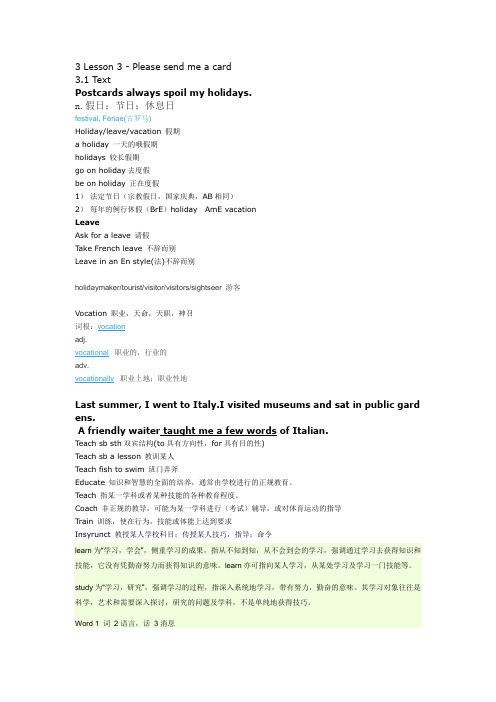
3 Lesson 3 - Please send me a card3.1 TextPostcards always spoil my holidays.n.假日;节日;休息日festival, Feriae(古罗马)Holiday/leave/vacation 假期a holiday 一天的哦假期holidays 较长假期go on holiday去度假be on holiday 正在度假1)法定节日(宗教假日,国家庆典,AB相同)2)每年的例行休假(BrE)holiday AmE vacationLeaveAsk for a leave 请假T ake French leave 不辞而别Leave in an En style(法)不辞而别holidaymaker/tourist/visitor/visitors/sightseer 游客Vocation 职业,天命,天职,神召词根:vocationadj.vocational职业的,行业的adv.vocationally职业上地;职业性地Last summer, I went to Italy.I visited museums and sat in public gard ens.A friendly waiter taught me a few words of Italian.Teach sb sth双宾结构(to具有方向性,for具有目的性)Teach sb a lesson 教训某人Teach fish to swim 班门弄斧Educate 知识和智慧的全面的培养,通常由学校进行的正规教育。
Teach 指某一学科或者某种技能的各种教育程度。
Coach 非正规的教导,可能为某一学科进行(考试)辅导,或对体育运动的指导Train 训练,使在行为,技能或体能上达到要求Insyrunct 教授某人学校科目;传授某人技巧,指导;命令learn为“学习,学会”,侧重学习的成果,指从不知到知,从不会到会的学习,强调通过学习去获得知识和技能,它没有凭勤奋努力而获得知识的意味。
新概念英语第二册第三课讲解

Lesson 3 Please send me a card请给我寄一张明信片Postcards always spoil my holidays. Last summer, I went to Italy. I visited museums and sat in public gardens. A friendly waiter taught me a few words of Italian. Then he lent me a book. I read a few lines, but I did not understand a word. Everyday I thought about postcards. My holidays passed quickly, but I did not send cards to my friends. On the last day I made a big decision. I got up early and bought thirty-seven cards. I spent the whole day in my room, but I did not write a single card!New words and expressions 生词和短语send v. 寄,送postcard n. 明信片spoil v. 使索然无味,损坏museum n. 博物馆public adj. 公共的friendly adj. 友好的waiter n. 服务员,招待员lend v. 借给decision n. 决定whole adj. 整个的single adj. 唯一的,单一的参考译文明信片总搅得我假日不得安宁。
去年夏天,我去了意大利。
我参观了博物馆,还去了公园。
一位好客的服务员教了我几句意大利语,之后还借给我一本书。
我读了几行,但一个字也不懂。
新概念英语第二册词汇:第3课
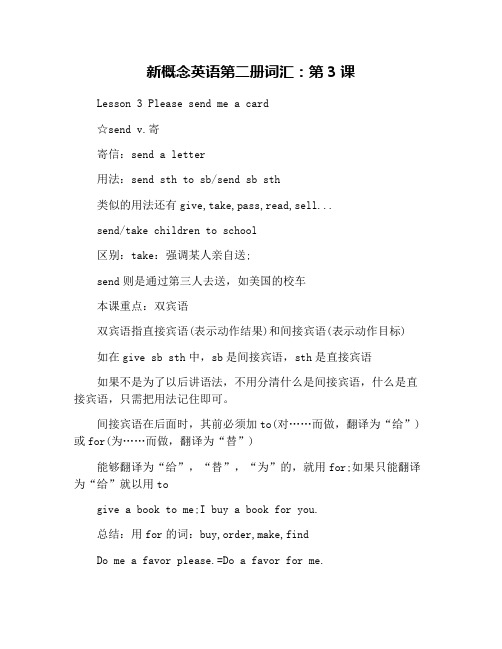
新概念英语第二册词汇:第3课Lesson 3 Please send me a card☆send v.寄寄信:send a letter用法:send sth to sb/send sb sth类似的用法还有give,take,pass,read,sell...send/take children to school区别:take:强调某人亲自送;send则是通过第三人去送,如美国的校车本课重点:双宾语双宾语指直接宾语(表示动作结果)和间接宾语(表示动作目标)如在give sb sth中,sb是间接宾语,sth是直接宾语如果不是为了以后讲语法,不用分清什么是间接宾语,什么是直接宾语,只需把用法记住即可。
间接宾语在后面时,其前必须加to(对……而做,翻译为“给”)或for(为……而做,翻译为“替”)能够翻译为“给”,“替”,“为”的,就用for;如果只能翻译为“给”就以用togive a book to me;I buy a book for you.总结:用for的词:buy,order,make,findDo me a favor please.=Do a favor for me.☆postcard n.明信片[注意]/t/和/k/前者失去爆破音简写为card,由此引申出:namecard/visiting card:名片ID card:身份证credit card:信用卡cash card☆spoil(spoiled or spoilt) v.使索然无味,损坏(重点词)几种破坏:打破玻璃用break;damage:破坏,但是水准不一定很重;destroy:破坏,彻底摧毁;以上三个是指物理上的破坏,而spoil主要指精神上spoil:把东西的质量变得不好了;生活中不顺心的事。
1.宠坏。
His parents spoiled the boy.2.毁了某人心情。
His arrival spoiled my holiday.☆museum n.博物馆那么多博物馆一定要记住我们的Palace Museum(故宫)哦☆public adj.公共的这个词我们在第一课见过了,基本用法和private一起记。
裕兴 新概念英语 第二册 Lesson 3 第3课 笔记讲义
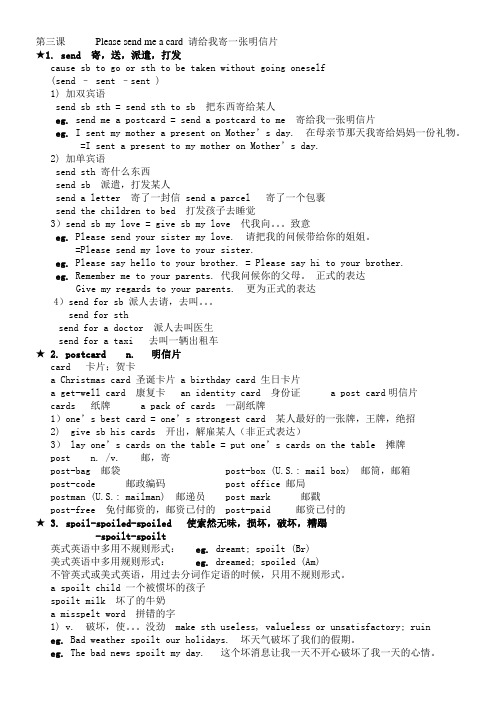
第三课Please send me a card 请给我寄一张明信片★1. send 寄,送,派遣,打发cause sb to go or sth to be taken without going oneself(send – sent –sent )1)加双宾语send sb sth = send sth to sb 把东西寄给某人eg. send me a postcard = send a postcard to me 寄给我一张明信片eg. I sent my mother a present on Mother’s day. 在母亲节那天我寄给妈妈一份礼物。
=I sent a present to my mother on Mother’s day.2)加单宾语send sth 寄什么东西send sb 派遣,打发某人send a letter 寄了一封信 send a parcel 寄了一个包裹send the children to bed 打发孩子去睡觉3)send sb my love = give sb my love 代我向。
致意eg. Please send your sister my love. 请把我的问候带给你的姐姐。
=Please send my love to your sister.eg. Please say hello to your brother. = Please say hi to your brother.eg. Remember me to your parents. 代我问候你的父母。
正式的表达Give my regards to your parents. 更为正式的表达4)send for sb 派人去请,去叫。
send for sthsend for a doctor 派人去叫医生send for a taxi 去叫一辆出租车★ 2. postcard n. 明信片card 卡片;贺卡a Christmas card 圣诞卡片 a birthday card 生日卡片a get-well card 康复卡 an identity card 身份证 a post card明信片cards 纸牌 a pack of cards 一副纸牌1)one’s best card = one’s strongest card 某人最好的一张牌,王牌,绝招2) give sb his cards 开出,解雇某人(非正式表达)3) lay one’s cards on the table = put one’s cards on the table 摊牌post n. /v. 邮,寄post-bag 邮袋 post-box (U.S.: mail box) 邮筒,邮箱post-code 邮政编码 post office 邮局postman (U.S.: mailman) 邮递员 post mark 邮戳post-free 免付邮资的,邮资已付的 post-paid 邮资已付的★ 3. spoil-spoiled-spoiled 使索然无味,损坏,破坏,糟蹋-spoilt-spoilt英式英语中多用不规则形式:eg. dreamt; spoilt (Br)美式英语中多用规则形式:eg. dreamed; spoiled (Am)不管英式或美式英语,用过去分词作定语的时候,只用不规则形式。
逐句精讲新概念英语第二册:第三课请给我寄一张明信片

Lesson 3 Please send me a card 课⽂内容: Postcards always spoil my holidays. Last summer, I went to Italy. I visited museums and sat in public gardens. A friendly waiter taught me a few words of Italian. Then he lent me a book. I read a few lines, but I did not understand a word. Everyday I thought about postcards. My holidays passed quickly, but I did not send cards to my friends. On the last day I made a big decision. I got up early and bought thirty-seven cards. I spent the whole day in my room, but I did not write a single card! 本⽂语法:双宾语 宾语主要分为两⼤类:直接宾语和间接宾语。
语法归纳:句⼦中的谓语动词后经常加两个宾语,直接宾语为动作的转载者,⼀般为⼈;直接宾语表⽰动作的真正承受者或结果,⼀般为物。
直接宾语和间接宾语可以互相交换位置,⼆者之间常⽤介词to或for进⾏连接。
to表⽰⽅向,对象,for表⽰⽬的。
例如: 标题:Please send me a card 请寄给我⼀张明信⽚。
语⾔点典型双宾语⽤法:me为间接宾语,a card为直接宾语。
此句可以改为:Please send a card to me. 逐句精讲: 1.Postcards always spoil my holidays. 明信⽚总是搅得我假⽇不得安宁。
新概念英语第二册第三课学习笔记
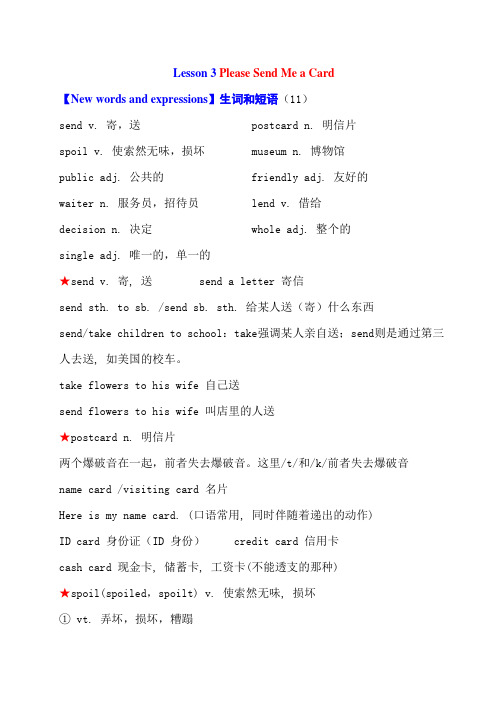
Lesson 3 Please Send Me a Card【New words and expressions】生词和短语(11)send v. 寄,送 postcard n. 明信片spoil v. 使索然无味,损坏 museum n. 博物馆public adj. 公共的 friendly adj. 友好的waiter n. 服务员,招待员 lend v. 借给decision n. 决定 whole adj. 整个的single adj. 唯一的,单一的★send v. 寄, 送 send a letter 寄信send sth. to sb. /send sb. sth. 给某人送(寄)什么东西send/take children to school:take强调某人亲自送;send则是通过第三人去送, 如美国的校车。
take flowers to his wife 自己送send flowers to his wife 叫店里的人送★postcard n. 明信片两个爆破音在一起,前者失去爆破音。
这里/t/和/k/前者失去爆破音name card /visiting card 名片Here is my name card. (口语常用, 同时伴随着递出的动作)ID card 身份证(ID 身份) credit card 信用卡cash card 现金卡, 储蓄卡, 工资卡(不能透支的那种)★spoil(spoiled,spoilt) v. 使索然无味, 损坏① vt. 弄坏,损坏,糟蹋The sad news spoiled our weekend. 这不幸的消息使我们没能过好周末。
The rain spoiled the school sports. 这场雨把学校运动会弄得一团糟。
This spoiled my day. What you said spoiled me.His arrival spoiled my holiday.② vt. 宠坏,惯坏,溺爱Don’t spoil your children.不能太惯孩子。
新概念英语第二册第三课please send me a card

• A. cost
B. pay
C. spend
D. /
• 答案: C
• 6.How much does the train ticket ____ from Harbin to Beijing? (2008 齐齐哈尔)
• A. cost
B. spend
C. pay
D. /
• 答案: A
• 7.—Do you often get online?
② vt. 宠坏,惯坏,溺爱 他的爷爷和奶奶把他宠坏了. His grandparents spoiled him.
Spoil the ending
辨析
spoil 把东西质量变差 destroy 彻底摧毁
break
打破
damage 破坏,程度不一定很重
• public ['pʌblik]
• ① adj. 公共的,公众的,社会的
All roads to Rome.条条大路通罗马。
Crazy for water and carnival?
• Go to Venice (威尼斯,意大利东北部城市)
a post office
a postcard
In foreign countries, visitors will send postcards to their friends when they travel.
噪音总是毁坏戏剧。上周我去了剧院。我买了一张票然后坐在一个好位置上。 The noise always spoil a st week,I went to the theater.I bought a ticket and sat in a good seat.
Part 1
新概念英语第二册第三课笔记
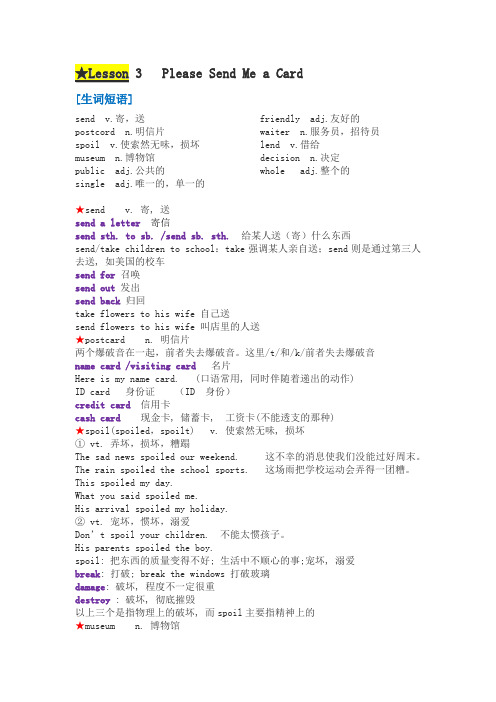
[生词短语]send v.寄,送 friendly adj.友好的postcord n.明信片 waiter n.服务员,招待员spoil v.使索然无味,损坏 lend v.借给museum n.博物馆 decision n.决定public adj.公共的 whole adj.整个的single adj.唯一的,单一的★send v. 寄, 送send a letter 寄信send sth. to sb. /send sb. sth.给某人送(寄)什么东西send/take children to school:take强调某人亲自送;send则是通过第三人去送, 如美国的校车send for召唤send out 发出send back归回take flowers to his wife 自己送send flowers to his wife 叫店里的人送★postcard n. 明信片两个爆破音在一起,前者失去爆破音。
这里/t/和/k/前者失去爆破音name card /visiting card名片Here is my name card. (口语常用, 同时伴随着递出的动作)ID card 身份证(ID 身份)credit card信用卡cash card现金卡, 储蓄卡, 工资卡(不能透支的那种)★spoil(spoiled,spoilt) v. 使索然无味, 损坏① vt. 弄坏,损坏,糟蹋The sad news spoiled our weekend. 这不幸的消息使我们没能过好周末。
The rain spoiled the school sports. 这场雨把学校运动会弄得一团糟。
This spoiled my day.What you said spoiled me.His arrival spoiled my holiday.② vt. 宠坏,惯坏,溺爱Don’t spoil your children. 不能太惯孩子。
新概念英语第二册 第三课
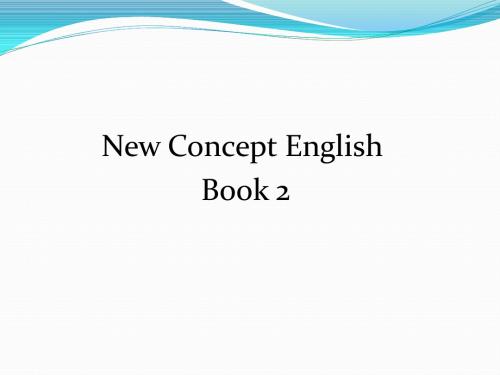
4、teach me a few words = teach a few words to me 双 宾语结构。a few words 几句话。 例句: I’d like to say a few words on the topic. Can I have a few words with you? (×) 吵架啦! Can I have a word with you? (√) 说句话而已。
2.实义动词的一般过去时态 肯定句要使用动词的过去式,否定句和疑问句 要使用助动词 do 和 does 的过去式 did. a.肯定句式:主语 + 动词(过去式)+ 其它 b.否定句式:主语 + didn’t + 动词(原形)+ 其 它 c.一般疑问句:Did + 主语+ 动词(原形)+ 其它
3. 情态动词的一般过去时态 a.肯定句式:主语 + 情态动词 + 其它. b. 否定句式:主语 + 情态动词 + not + 其它. c.一般疑问句:情态动词 + 主语 + 其它 例句: I could finish the work in an hour.
7、I did not understand a word. 我一个字也看不懂。 8、think about sth./sb. 想着 例句:I’m always thinking about you. 9、send cards to my friends = send my friends cards 双 宾语结构。 送出(take 和send)的区别: take 是某人亲自送;send 是通过第三人送
Answers: st summer, the writer spent his holiday in Italy. 2.His friends want him to send cards to them, he thought about the cards every day. 3. On the last day ,he decided to send cards to his friends, and he spent a whole day in his room.
(完整版)新概念英语第二册第三课(包含课文及完整课后练习)

Lesson 3 Please send me a card 请给我寄一张明信片First listen and then answer the question.听录音,然后回答以下问题。
How many cards did the writer send?Postcards always spoil my holidays. Last summer, I went to Italy. I visited museums and sat in public gardens. A friendly waiter taught me a few words of Italian. Then he lent me a book. I read a few lines, but I did not understand a word. Everyday I thought about postcards. My holidays passed quickly, but I did not send cards to my friends. On the last day I made a big decision. I got up early and bought thirty-seven cards.I spent the whole day in my room, but I did not write a single card!New words and expressions 生词和短语send v. 寄,送friendly adj. 友好的postcard n. 明信片waiter n. 服务员,招待员spoil v. 使索然无味,损坏lend v. 借给museum n. 博物馆decision n. 决定public adj. 公共的single adj. 唯一的,单一的whole adj. 整个的Note on the text 课文注释1 a few words,几句话。
新概念英语第二册+Lesson3+Please+send+me+a+card+讲义
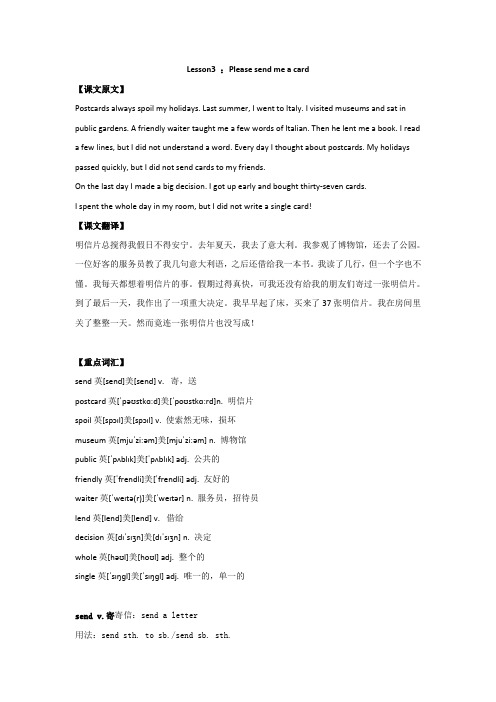
Lesson3 :Please send me a card【课文原文】Postcards always spoil my holidays. Last summer, I went to Italy. I visited museums and sat in public gardens. A friendly waiter taught me a few words of Italian. Then he lent me a book. I read a few lines, but I did not understand a word. Every day I thought about postcards. My holidays passed quickly, but I did not send cards to my friends.On the last day I made a big decision. I got up early and bought thirty-seven cards.I spent the whole day in my room, but I did not write a single card!【课文翻译】明信片总搅得我假日不得安宁。
去年夏天,我去了意大利。
我参观了博物馆,还去了公园。
一位好客的服务员教了我几句意大利语,之后还借给我一本书。
我读了几行,但一个字也不懂。
我每天都想着明信片的事。
假期过得真快,可我还没有给我的朋友们寄过一张明信片。
到了最后一天,我作出了一项重大决定。
我早早起了床,买来了37张明信片。
我在房间里关了整整一天。
然而竟连一张明信片也没写成!【重点词汇】send 英[send]美[send] v. 寄,送postcard 英[ˈpəʊstkɑːd]美[ˈpoʊstkɑːrd]n. 明信片spoil 英[spɔɪl]美[spɔɪl] v. 使索然无味,损坏museum 英[mjuˈziːəm]美[mjuˈziːəm] n. 博物馆public 英[ˈpʌblɪk]美[ˈpʌblɪk] adj. 公共的friendly 英[ˈfrendli]美[ˈfrendli] adj. 友好的waiter 英[ˈweɪtə(r)]美[ˈweɪtər] n. 服务员,招待员lend 英[lend]美[lend] v. 借给decision 英[dɪˈsɪʒn]美[dɪˈsɪʒn] n. 决定whole 英[həʊl]美[hoʊl] adj. 整个的single 英[ˈsɪŋɡl]美[ˈsɪŋɡl] adj. 唯一的,单一的send v.寄寄信:send a letter用法:send sth. to sb./send sb. sth.类似的用法还有 give,take,pass,read,sell...send/take children to school区别:take:强调某人亲自送;send则是通过第三人去送,如美国的校车postcard n.明信片简写为card,由此引申出:namecard/visiting card:名片ID card:身份证credit card:信用卡spoil(spoiled or spoilt) v.使索然无味,损坏(重点词)几种破坏:打破玻璃用break;damage:破坏,但是程度不一定很重;destroy:破坏,彻底摧毁;以上三个是指物理上的破坏,而spoil主要指精神上:spoil:把东西的质量变得不好了;生活中不顺心的事。
新概念英语第二册第三课Please send me a card
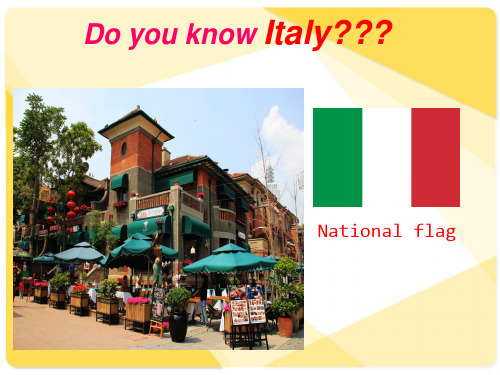
谓语构成
一般过去时的谓语构成:由动词 的过去式构成(参看书本)
规则变化
1.一般加ed work — worked 2.以e结尾加d change — changed 3.末尾只有一个辅音字母的重读闭 音节词,先双写这个辅音字母,再 加ed . stop — stopped
Do you know Italy???
National flag
Crazy for ancient culture?
Wow! Rome (Capital) is your best choice!
All roads to Rome.
古罗马斗兽场
Crazy for water and carnival?
一般过去时态
什么是一般过去时?
动词的一般过去时态表示过去发生的 动作、情况或存在的状态。 行为动词(即实义动词)的过去式没有人称 和数的变化。
所有时态都是通过
动词
变化来表现的
用于一般过去时的时间状语
1.时间状语+ago 连用
ቤተ መጻሕፍቲ ባይዱ
st +时间状语 3.yesterday+时间状语 4.one +时间状语 5.that +时间状语
Words & Phrases ★send v.寄,送
send sth. to sb. /send sb. sth. 给某人送 (寄)什么东西 send/take children to school send a letter 寄信
take和send 的区别:
take强调某人亲自送 send则是通过第三人去送,如校车 take flowers to his wife (自己送 ) send flowers to his wife (叫店员送) 类似的用法还有give,take,pass,sell, show,lend.....
- 1、下载文档前请自行甄别文档内容的完整性,平台不提供额外的编辑、内容补充、找答案等附加服务。
- 2、"仅部分预览"的文档,不可在线预览部分如存在完整性等问题,可反馈申请退款(可完整预览的文档不适用该条件!)。
- 3、如文档侵犯您的权益,请联系客服反馈,我们会尽快为您处理(人工客服工作时间:9:00-18:30)。
Lesson 3 Please send me a card 请给我寄一张明信片First listen and then answer the question.听录音,然后回答以下问题。
How many cards did the writer send?Postcards always spoil my holidays. Last summer, I went to Italy. I visited museums and sat in public gardens. A friendly waiter taught me a few words of Italian. Then he lent me a book. I read a few lines, but I did not understand a word. Everyday I thought about postcards. My holidays passed quickly, but I did not send cards to my friends. On the last day I made a big decision. I got up early and bought thirty-seven cards. I spent the whole day in my room, but I did not write a single card!New words and expressions 生词和短语send v. 寄,送 friendly adj. 友好的postcard n. 明信片 waiter n. 服务员,招待员spoil v. 使索然无味,损坏 lend v. 借给museum n. 博物馆 decision n. 决定public adj. 公共的 single adj. 唯一的,单一的whole adj. 整个的Note on the text 课文注释1 a few words,几句话。
2 lent me a book中,lent是“借出”的意思。
我们常说lend sb. sth 或lend sth to sb.。
borrow 是“借入”的意思,常用的结构是borrow sth.或borrow sth. from sb.参考译文明信片总搅得我假日不得安宁。
去年夏天,我去了意大利。
我参观了博物馆,还去了公园。
一位好客的服务员教了我几句意大利语,之后还借给我一本书。
我读了几行,但一个字也不懂。
我每天都想着明信片的事。
假期过得真快,可我还没有给我的朋友们寄过一张明信片。
到了最后一天,我作出了一项重大决定。
我早早起了床,买来了37张明信片。
我在房间里关了整整一天。
然而竟连一张明信片也没写成!Summary writing 摘要写作Answer these questions in not more than 50 words.回答下列问题,将答案组成一个段落,不要超过50个单词。
1Do postcards always spoil the writer’s holiday or not?2Where did he spend his holidays last summer?3What did he think about every day?4Did he send any cards to his friends or not?5What is the writer’s big decision?6Where did he stay all day?7Did he write any cards or not?Key structures 关键句型What happened? 一般过去时Read this short conversation. Pay close attention to the verbs in italics. Each of these verbs tells us what happened.读一读下面的这段对话,要特别注意用斜体印出的动词,每个动词都告诉我们发生了什么事。
POLICEMAN: Did you see the accident, sir?先生,你看到那个事故吗?MAN: Yes, I did. The driver of that car hit that post over there.是的,我看到了。
那辆车的司机撞到那边的杆子上。
POLICEMAN: What happened?发生了什么事情?MAN: A dog ran across the road and the driver tried to avoid it. The car suddenly came towards me. It climbed on to the pavement and crashed into that post.一条狗穿过马路,那位司机企图躲开狗。
突然,汽车朝我开过来。
它走上人行道,撞到那根杆子上。
POLICEMAN: What did you do?你做了什么?MAN: I ran across the street after the dog.我穿过马路去追狗。
POLICEMAN: Why did you do that? Were you afraid of the car?你为什么这样做呢?你怕汽车吗?MAN: I was n’t afraid of the car. I was afraid of the driver. The driver got out of the car and began shouting at me. He was very angry with me. You see, it wasmy dog.我不怕汽车,我怕那个司机。
他下了车,开始朝我喊了起来。
他对我很生气。
你知道的,那是我的狗。
Exercises 练习A Look at the passage ‘Please send me a card’. Put a line under all the verbs which tellus what happened to the writer when he was on holiday in Italy.重读课文,找出那些说明作者在意大利度假时所发生的事情的动词,在这些动词的下面划上横线。
B Give the correct form of all the verbs in parentheses. Do not refer to the passage untilyou finish theexercise.用括号中的动词的正确形式填空,完成练习后再对照课文,核对你的答案。
Last summer, I (go) to Italy. I (visit) museums and (sit) inpublic gardens. A friendly waiter ( teach) me a few words of Itanlian. Then he(lend) me a book. I (read) a few lines, but I (not understand) aword. Every day I (think) about postcards. My holidays (pass) quickly, but I(not send) cards to my friends. On the last day, I (make) a decision.I(get) up early and (buy) thirty-seven cards. I (spend) the whole day in myroom, but I (not write) a single card!C Give the correct form of the verbs in parentheses in the passage below. Each verb musttell us what happened.用括号中动词的正确形式填空,每个动词都必须告诉我们发生了什么事情。
My friend, Roy, (die) last year. He (leave) me his CD player and his collectionof CDs. Roy (spend) a lot of money on CDs. He (buy) one or two CDsevery week. He never (go) to the cinema or to the theatre. He (stay) athome every evening and (listen) to music. He often (lend) CDs to his friends.Sometimes they (keep) them. He (lose) many CDs in this way.Special difficulties 难点英语中有些动词可以带两个宾语,这些动词大多具有“给予”的含义。
如课文中第3行的句子“He lent me a book”中,动词lent后面带有表示动作结果的直接宾语( a book) 和表示动作目标的间接宾语(me).间接宾语在大多数情况下置于直接宾语之前,如果间接宾语在后,间接宾语前必须加“to”或(表示动作为什么人而做) “for”. 因此,课文中的句子也可以改成:He lent a book to me. 注意一下例句。
Instead of saying: We can say:除了这种表达方法外:还可以说:He lent me a book. He lent a book to me.He sent me a card. He sent a card to me.He passed me the salt. He passed the salt to me.She bought me a tie. She bought a tie for me.She made me a cake. She made a cake for me.Exercise 练习Write each of the following sentences in a different way.改写以下句子。
1 He paid the shopkeeper some money.2 He handed me the prize.3 The writer brought a bottle of beer to the man.4 He sold all his books to me.5 The shop assistant found some curtain material for me.6 He did me a big favour.7 She showed her husband her new hat.8 She promised a reward to the finder.9 He gave his son some advice.10 His uncle left him some money.11 He is teaching English to us.12 I bought this bunch of flowers for you.13 Bring that book to me please.14 He offered me a cigarette.15 Read me the first paragraph.16 I’ve ordered some soup for you.17 I owe him a lot of money.18 Pass the mustard to your father.Multiple choice questions 多项选择题Comprehension 理解1 The writer ___________.(a)doesn’t like buying postcards (b)doesn’t like receiving postcards(c)doesn’t like writing postcards (d)doesn’t like postcards2 What was the writer’s ‘big decision’?(a)He decided to write postcards to his friends. (b)He decided to spend the whole day in his room.(c)He decided to buy a lot of postcards. (d)He decided not to write a single card.Structure 句型3 Last week he went to Italy. He was _________ Italy last summer.(a)at (b)to (c)in (d)on4 ____________ him a few words of Italian? The writer.(a)Who taught (b)Who did teach (c)What did he teach (d)Whom did he teach5 He was a friendly waiter. He spoke to the writer _________.(a)friend (b)as friends (c)like friends (d)in a friendly way6 The writer __________ a few lines, but he didn’t understand a word.(a)reads (b)read (c)red (d)reading7 He spent the whole day in his room. He was in his room _________ day.(a)the hole (b)the all (c)all (d)all ofVocabulary 词汇8 A waiter usually works in a __________.(a)public garden (b)shop (c)restaurant (d)private house9 The waiter lent him a book. He _______ a book from the waiter.(a)lent (b)borrowed (c)took (d)stole10 On the last day he made a big decision. It was the _______ day of his holiday.(a)final (b)end (c)latest (d)bottom11 He made a big decision. He _________.(a)thought about it (b)made up his mind (c)changed his mind (d)made a wish12 He didn’t write a single card. So he __________.(a)wrote only one (b)didn’t write even one (c)wrote just one (d)wrote all the cardsexcept oneSentence structure句子结构Rewrite this sentence, then check your answer against the text.改写以下句子,然后对照课文第5-6行,核对你的答案。
